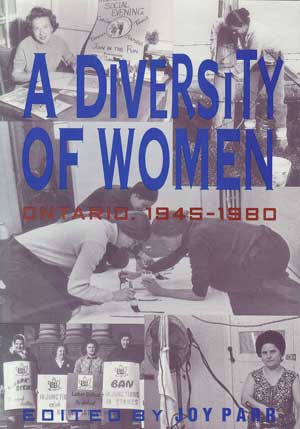A Diversity of Women: Ontario 1945-80

Our perception of women’s roles has changed dramatically since 1945. In this collection Joy Parr has brought together ten studies from a variety of disciplines examining changing ideas about women.
Mariana Valverde writes about teenage girls in the immediate postwar years and finds that stereotypes of a supposedly simple, secure, politically quiescent, and sexually conformist life do not really hold. Joy Parr follows women shoppers of the early 1950s, in their sometimes comical encounters with male designers, manufacturers, and retailers, in search of the tools and totems of modernity for their homes. Increasingly these homes were in suburban subdivisions, whose pleasures and possibilities for women Veronica Strong-Boag reconsiders. Joan Sangster reminds us that wage-earning mothers were numerous in the fifties and sixties, and through a juxtaposition of their own stories with contemporary studies tells much about these self-denying women’s lives. Franca Iacovetta discusses the experiences of immigrant and refugee women in northwestern and south-central Ontario, experiences that were interpreted through their starkly different European wartime memories. Based upon her work among the rural women of southwestern Ontario, Nora Cebotarev charts the changes that transformed farm families and finances from the sixties to the eighties. Ester Reiter compares the recollections of women who had worked together during the 1960s in an auto parts plant in the Niagara Peninsula with contemporary newspaper accounts of a strike, and leads us into a complex narrative of gender and militancy. Nancy Adamson reconsiders the diversity of feminist organizing within the province over the decades since second-wave feminism began; she tracks the different needs and paths that brought women to the women’s liberation movement and the ways in which their feminist analysis arose from their experience as community activists. Linda Cardinal writes about Franco-Ontarian women, charting the ways in which feminist activists challenged and were challenged as they worked with traditional farm and church-based women’s groups in northern and eastern Ontario. Marlene Brant Castellano and Janice Hill introduce us to four aboriginal women: Edna Manitowabi, Jeannette Corbiere Lavell, Sylvia Maracle, and Emily Faries, whose work has been to reclaim and build upon the knowledge and responsibilities long entrusted to the women of Ontario’s First Nations.
Reviews
A welcome addition to the published canon of women’s history. If any further proof were needed to convince students of women’s history that the category ‘women’ is not a homogeneous one, here it is.
Linda Ambrose, The Canadian Historical Review
Purchase
Amazon: https://www.amazon.ca/Diversity-Women-Ontario-since-1945/dp/0802076955

